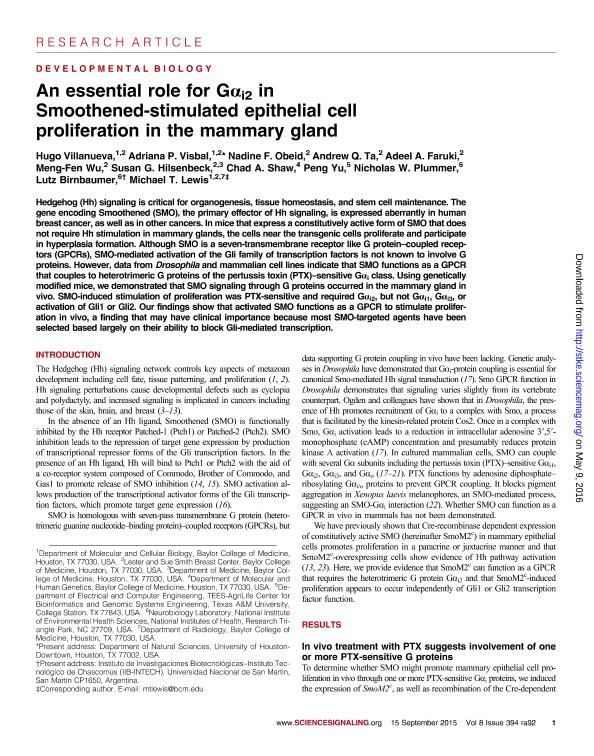Mostrar el registro sencillo del ítem
dc.contributor.author
Villanueva, Hugo
dc.contributor.author
Visbal, Adriana P.
dc.contributor.author
Obeid, Nadine F.
dc.contributor.author
Ta, Andrew Q.
dc.contributor.author
Faruki, Adeel A.
dc.contributor.author
Wu, Meng Fen
dc.contributor.author
Hilsenbeck, Susan G.
dc.contributor.author
Shaw, Chad A.
dc.contributor.author
Yu, Peng
dc.contributor.author
Plummer, Nicholas W.
dc.contributor.author
Birnbaumer, Lutz

dc.contributor.author
Lewis, Michael T.
dc.date.available
2018-04-24T19:05:46Z
dc.date.issued
2015-09
dc.identifier.citation
Villanueva, Hugo; Visbal, Adriana P.; Obeid, Nadine F.; Ta, Andrew Q.; Faruki, Adeel A.; et al.; An essential role for Gα i2 in Smoothened-stimulated epithelial cell proliferation in the mammary gland; American Association for the Advancement of Science; Science Signaling; 8; 394; 9-2015; 1-11; ra92
dc.identifier.issn
1937-9145
dc.identifier.uri
http://hdl.handle.net/11336/43304
dc.description.abstract
Hedgehog (Hh) signaling is critical for organogenesis, tissue homeostasis, and stem cell maintenance. The gene encoding Smoothened (SMO), the primary effector of Hh signaling, is expressed aberrantly in human breast cancer, as well as in other cancers. In mice that express a constitutively active form of SMO that does not require Hh stimulation in mammary glands, the cells near the transgenic cells proliferate and participate in hyperplasia formation. Although SMO is a seven-transmembrane receptor like G protein–coupled receptors (GPCRs), SMO-mediated activation of the Gli family of transcription factors is not known to involve G proteins. However, data from Drosophila and mammalian cell lines indicate that SMO functions as a GPCR that couples to heterotrimeric G proteins of the pertussis toxin (PTX)–sensitive Gαi class. Using genetically modified mice, we demonstrated that SMO signaling through G proteins occurred in the mammary gland in vivo. SMO-induced stimulation of proliferation was PTX-sensitive and required Gαi2, but not Gαi1, Gαi3, or activation of Gli1 or Gli2. Our findings show that activated SMO functions as a GPCR to stimulate proliferation in vivo, a finding that may have clinical importance because most SMO-targeted agents have been selected based largely on their ability to block Gli-mediated transcription.
dc.format
application/pdf
dc.language.iso
eng
dc.publisher
American Association for the Advancement of Science

dc.rights
info:eu-repo/semantics/openAccess
dc.rights.uri
https://creativecommons.org/licenses/by-nc-sa/2.5/ar/
dc.subject.classification
Otras Ciencias Biológicas

dc.subject.classification
Ciencias Biológicas

dc.subject.classification
CIENCIAS NATURALES Y EXACTAS

dc.title
An essential role for Gα i2 in Smoothened-stimulated epithelial cell proliferation in the mammary gland
dc.type
info:eu-repo/semantics/article
dc.type
info:ar-repo/semantics/artículo
dc.type
info:eu-repo/semantics/publishedVersion
dc.date.updated
2018-04-12T14:31:11Z
dc.journal.volume
8
dc.journal.number
394
dc.journal.pagination
1-11; ra92
dc.journal.pais
Estados Unidos

dc.description.fil
Fil: Villanueva, Hugo. Baylor College of Medicine; Estados Unidos
dc.description.fil
Fil: Visbal, Adriana P.. Baylor College of Medicine; Estados Unidos
dc.description.fil
Fil: Obeid, Nadine F.. Baylor College of Medicine; Estados Unidos
dc.description.fil
Fil: Ta, Andrew Q.. Baylor College of Medicine; Estados Unidos
dc.description.fil
Fil: Faruki, Adeel A.. Baylor College of Medicine; Estados Unidos
dc.description.fil
Fil: Wu, Meng Fen. Baylor College of Medicine; Estados Unidos
dc.description.fil
Fil: Hilsenbeck, Susan G.. Baylor College of Medicine; Estados Unidos
dc.description.fil
Fil: Shaw, Chad A.. Baylor College of Medicine; Estados Unidos
dc.description.fil
Fil: Yu, Peng. Texas A&M University; Estados Unidos
dc.description.fil
Fil: Plummer, Nicholas W.. National Institutes of Health; Estados Unidos
dc.description.fil
Fil: Birnbaumer, Lutz. National Institutes of Health; Estados Unidos. Consejo Nacional de Investigaciones Científicas y Técnicas; Argentina
dc.description.fil
Fil: Lewis, Michael T.. Baylor College of Medicine; Estados Unidos
dc.journal.title
Science Signaling

dc.relation.alternativeid
info:eu-repo/semantics/altIdentifier/doi/http://dx.doi.org/10.1126/scisignal.aaa7355
dc.relation.alternativeid
info:eu-repo/semantics/altIdentifier/url/http://stke.sciencemag.org/content/8/394/ra92
Archivos asociados
